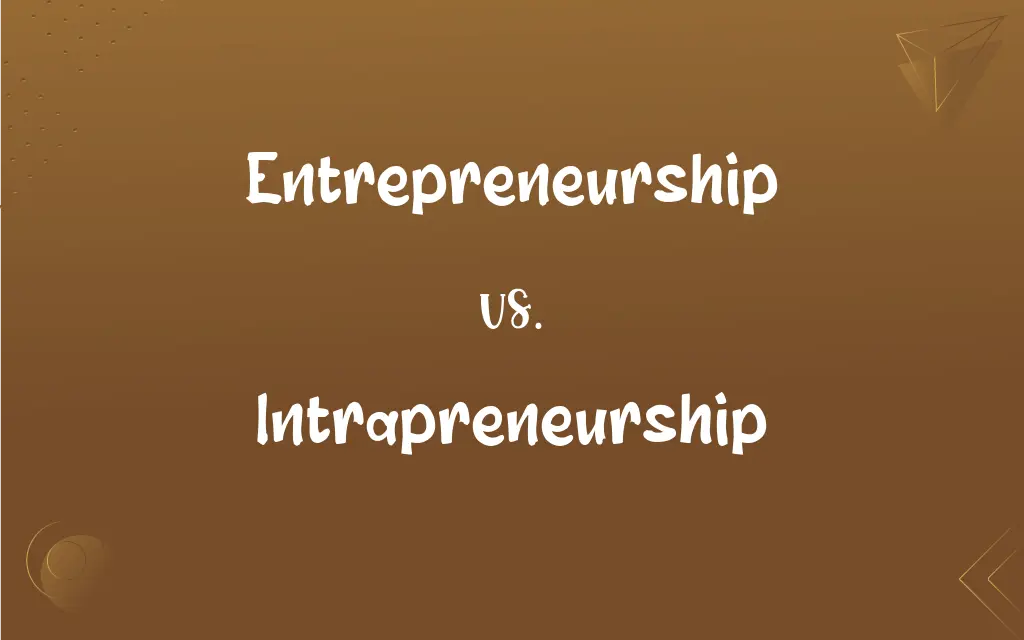Entrepreneurship vs. Intrapreneurship: What's the Difference?
Edited by Aimie Carlson || By Janet White || Published on November 13, 2023
Entrepreneurship; The act of creating and managing a new business. Intrapreneurship; Innovating within an existing company as an employee.

Key Differences
Entrepreneurship encompasses the journey of starting and operating one's own business venture, while Intrapreneurship involves employees within a company acting like entrepreneurs to innovate and drive change.
Entrepreneurship often entails financial risk as the entrepreneur invests their own resources, while Intrapreneurship allows for innovation without personal financial risk, using the company's resources.
An entrepreneur, driven by Entrepreneurship, establishes the company's vision and direction from scratch. In contrast, an intrapreneur, guided by Intrapreneurship, works to innovate within the established boundaries and vision of a pre-existing company.
Entrepreneurship can lead to the establishment of an entirely new organization, brand, or system. Intrapreneurship, however, seeks to introduce innovations, processes, or products that can enhance or diversify an already existing company's offerings.
While both Entrepreneurship and Intrapreneurship require a pioneering spirit and innovative thinking, Entrepreneurship operates in the external business environment, and Intrapreneurship operates within the internal confines of an organization.
ADVERTISEMENT
Comparison Chart
Nature
Starting a new business
Innovating within an existing business
Financial Risk
Personal investment and risk
Uses company resources, no personal financial risk
Scope
Establishes company's direction from scratch
Innovates within an established company's direction
Outcome
Creation of a new organization or brand
Enhancements or diversifications for an existing company
Operational Environment
External business landscape
Internal confines of an organization
ADVERTISEMENT
Entrepreneurship and Intrapreneurship Definitions
Entrepreneurship
The spirit of enterprise and innovation.
The city's growth was fueled by the rise of Entrepreneurship.
Intrapreneurship
Innovation within an existing company by an employee.
His Intrapreneurship led to the development of a groundbreaking product.
Entrepreneurship
A venture undertaken to innovate and earn profit.
Entrepreneurship has transformed the tech industry over the years.
Intrapreneurship
Entrepreneurial activities within an organizational setting.
Modern businesses value Intrapreneurship for staying competitive.
Entrepreneurship
The initiative to start and run a new business.
Steve's Entrepreneurship led him to open his own bakery.
Intrapreneurship
Pursuit of new ventures or ideas within one's company.
Intrapreneurship often leads to the evolution of existing business models.
Entrepreneurship
The act of developing and managing a business venture.
Many universities now offer courses in Entrepreneurship.
Intrapreneurship
Employees taking lead to innovate and drive internal change.
With Intrapreneurship, she transformed the company's marketing strategy.
Entrepreneurship
Risk-taking in pursuit of business opportunities.
She ventured into Entrepreneurship despite the challenges ahead.
Intrapreneurship
The application of entrepreneurial skills within a firm.
Many corporations are promoting Intrapreneurship to foster innovation.
Entrepreneurship
A person who organizes, operates, and assumes the risk for a business venture.
Intrapreneurship
The practice of applying entrepreneurial skills and approaches within an established company.
Entrepreneurship
The art or science of innovation and risk-taking for profit in business.
Intrapreneurship
Being creative with ideas and procedures
Entrepreneurship
The quality of being an entrepreneur.
Entrepreneurship
The activity of organizing, managing, and assuming the risks of a business enterprise.
FAQs
How does Entrepreneurship differ from Intrapreneurship in terms of risk?
Entrepreneurship often involves personal financial risk, whereas Intrapreneurship leverages company resources without personal financial liability.
What are the benefits of Intrapreneurship for a company?
Intrapreneurship can lead to product diversification, increased competitiveness, and faster adaptation to market changes.
How do companies foster Intrapreneurship?
By promoting a culture of innovation, offering resources, and creating platforms for idea sharing.
Are entrepreneurs always founders?
Not always. While many entrepreneurs start businesses, others might buy or take over existing ones.
Can a company promote both Entrepreneurship and Intrapreneurship?
While a company directly promotes Intrapreneurship, it can support Entrepreneurship by incubating startups or encouraging entrepreneurial thinking.
Is Entrepreneurship limited to startups?
No, Entrepreneurship can span startups, small businesses, and large-scale ventures.
Is Entrepreneurship always about profit?
While many associate Entrepreneurship with profit, it can also be driven by social or environmental goals.
Can Intrapreneurship lead to the creation of a new company?
Yes, some successful intrapreneurial projects might spin off into separate entities or subsidiaries.
How do companies benefit from Entrepreneurship?
Companies can acquire or collaborate with entrepreneurial ventures for new technologies, market access, and innovative strategies.
Can Intrapreneurship exist in any company department?
Yes, from R&D to marketing, any department can embody the spirit of Intrapreneurship.
Do intrapreneurs have ownership of their creations?
Typically, innovations made under Intrapreneurship belong to the company, not the individual intrapreneur.
Can one person embody both Entrepreneurship and Intrapreneurship?
Yes, someone can start their own venture (Entrepreneurship) and later innovate within a larger organization (Intrapreneurship).
Why is Entrepreneurship important?
It drives innovation, creates jobs, contributes to economic growth, and addresses societal needs.
What skills are common to both Entrepreneurship and Intrapreneurship?
Innovation, problem-solving, risk-taking, and visionary thinking are vital for both.
Are all intrapreneurs future entrepreneurs?
Not necessarily, but the skills gained from Intrapreneurship can certainly aid in entrepreneurial endeavors.
Do all entrepreneurs need a business background?
No, many successful entrepreneurs come from diverse backgrounds but possess a passion and vision.
How do Entrepreneurship and Intrapreneurship impact the economy?
Both drive innovation, job creation, and economic growth, but in different contexts.
Can Entrepreneurship be taught?
While certain entrepreneurial traits are innate, aspects like business management, strategy, and innovation can be taught.
Which is more challenging, Entrepreneurship or Intrapreneurship?
Both have unique challenges. Entrepreneurs face market validation and financial risk, while intrapreneurs navigate corporate bureaucracy.
Is Intrapreneurship a new concept?
While the term is relatively modern, the concept of internal innovation in companies is age-old.
About Author
Written by
Janet WhiteJanet White has been an esteemed writer and blogger for Difference Wiki. Holding a Master's degree in Science and Medical Journalism from the prestigious Boston University, she has consistently demonstrated her expertise and passion for her field. When she's not immersed in her work, Janet relishes her time exercising, delving into a good book, and cherishing moments with friends and family.
Edited by
Aimie CarlsonAimie Carlson, holding a master's degree in English literature, is a fervent English language enthusiast. She lends her writing talents to Difference Wiki, a prominent website that specializes in comparisons, offering readers insightful analyses that both captivate and inform.






































































